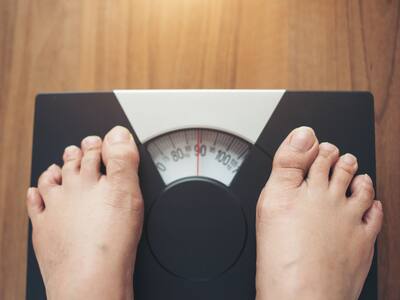Don’t Miss Out on the Latest Updates.
Subscribe to Our Newsletter Today!
Weight Loss Becomes Extra Difficult If You Don't Sleep Enough: Decoding The Link

It can be frustrating to see no results after doing everything you can to lose weight. But what if the simple reason is that you are not getting enough sleep. Yes, not getting enough sleep can sabotage your weight loss plans. Here's how!
You've been trying to do everything to get that extra weight off, but it's just not working out! What could be the problem? While health problems can disrupt your weight loss plans, especially if you haven't been taking good care of yourself by neglecting the treatment. With that said, some people without any chronic conditions also find it difficult to lose weight. What could be the possible reason?
Everybody is different and how yours behave can be totally different from your best friend's. But one reason that stands true for most of us is 'not getting enough sleep.' If you haven't been able to lose weight and there's no specific reason why that could be, then you might want to check your "sleep schedule."
How Does Sleep Affect Your Weight?
You might not realise it, but there's a link between how well you slept last night and your hunger today, and there's plenty of evidence to back it up. A JAMA Internal Medicine journal study found that when 80 adults with a habitual sleep of less than 6.5 hours per night extended their bedtime to 8.5 hours per night, their energy levels improved, and their bodies required less food to keep them energised throughout the day. Another study published in the International Journal of Obesity also found that your sleeping habits directly impact your weight.
Also Read
If you are not sleeping well, your hunger hormones won't work the way they should. Another reason why sleep is important is that poor sleep quality can also impair a person's energy levels, making them less likely to engage in physical exercise, which can contribute to undesirable weight gain.
You'll have greater energy and a healthy appetite, with sharper hunger cues that will allow you to eat more intuitively if you get enough quality sleep. Lack of sleep correlates to a lack of energy, therefore getting enough sleep will influence the types of meals you crave throughout the day. The more rested you are, the less likely you are to seek out high-sugar, high-fat meals and snacks.
How To Get Better Sleep?
Now you know how important it is to have a proper sleep-wake cycle to keep your weight in check, let's go through some ways that will help you sleep better at night:
- Limit blue light exposure, especially during the evening, as it tricks your body into thinking that it's daytime.
- Caffeine can degrade sleep quality, primarily if used in substantial quantities late in the afternoon or evening.
- Long naps during the day may interfere with sleep quality. Stop napping or cut your naps short if you're having difficulties sleeping at night.
- Avoid drinking alcohol before bedtime since it can alter sleep patterns by reducing evening melatonin production.
- To get better sleep, improve your bedroom environment by removing external light and noise.
- A heavy meal before bedtime might cause insomnia and hormone disturbance. Certain meals and snacks eaten a few hours before bedtime, on the other hand, maybe beneficial.
- Try relaxing activities like hot baths and meditation to help you sleep.
- Sleep apnea is one of many frequent conditions that can cause poor sleep. If you're having trouble sleeping on a regular basis, see a doctor.
- Sleep quality and hip or back pain can all be affected by your bed, mattress, and pillow. Purchase high-quality bedding.
- One of the best strategies to ensure a good night's sleep is to exercise regularly during daylight hours.


